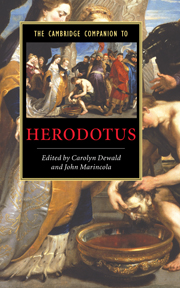Book contents
- Frontmatter
- Introduction
- 1 Herodotus and the poetry of the past
- 2 Herodotus and his prose predecessors
- 3 Herodotus and tragedy
- 4 The intellectual milieu of Herodotus
- 5 Meta-historiē: Method and genre in the Histories
- 6 The syntax of historiē: How Herodotus writes
- 7 Speech and narrative in the Histories
- 8 Herodotus, Sophocles and the woman who wanted her brother saved
- 9 Stories and storytelling in the Histories
- 10 Humour and danger in Herodotus
- 11 Location and dislocation in Herodotus
- 12 Herodotus and the natural world
- 13 Herodotus and Greek religion
- 14 Warfare in Herodotus
- 15 Herodotus, political history and political thought
- 16 Herodotus and the cities of mainland Greece
- 17 An alternate world: Herodotus and Italy
- 18 Herodotus and Persia
- 19 Herodotus and foreign lands
- 20 Herodotus' influence in antiquity
- Glossary
- Timeline
- Bibliography
- Index
- Series List
1 - Herodotus and the poetry of the past
Published online by Cambridge University Press: 28 January 2007
- Frontmatter
- Introduction
- 1 Herodotus and the poetry of the past
- 2 Herodotus and his prose predecessors
- 3 Herodotus and tragedy
- 4 The intellectual milieu of Herodotus
- 5 Meta-historiē: Method and genre in the Histories
- 6 The syntax of historiē: How Herodotus writes
- 7 Speech and narrative in the Histories
- 8 Herodotus, Sophocles and the woman who wanted her brother saved
- 9 Stories and storytelling in the Histories
- 10 Humour and danger in Herodotus
- 11 Location and dislocation in Herodotus
- 12 Herodotus and the natural world
- 13 Herodotus and Greek religion
- 14 Warfare in Herodotus
- 15 Herodotus, political history and political thought
- 16 Herodotus and the cities of mainland Greece
- 17 An alternate world: Herodotus and Italy
- 18 Herodotus and Persia
- 19 Herodotus and foreign lands
- 20 Herodotus' influence in antiquity
- Glossary
- Timeline
- Bibliography
- Index
- Series List
Summary
When Herodotus came to write his history sometime in the mid-fifth century, the medium of prose was a relatively new phenomenon: it was poetry that had dominated discourse for centuries, and had done so in a variety of genres: narrative and didactic epic, personal and choral lyric, hymns, drinking songs, oracles, and epinician odes in praise of victorious athletes. The poet in the archaic world was not usually an isolated 'artistic' figure, but instead often intimately involved in the life of his city, and he used poetry to teach and persuade, among other things. That the poet was primarily a teacher was assumed in the intellectual revolution of the sixth century, when writers such as Heraclitus and Xenophanes began to question and criticise Greek traditions by focussing especially on Homer and Hesiod - sometimes even using poetry in their own attacks. And if the biographical tradition is true, Herodotus may have known intimately about historical poetry from his uncle Panyassis who wrote a long verse epic on the foundations of Ionian cities.
- Type
- Chapter
- Information
- The Cambridge Companion to Herodotus , pp. 13 - 28Publisher: Cambridge University PressPrint publication year: 2006
- 10
- Cited by



